
Cerebus is a comic book series created by Canadian cartoonist Dave Sim, which ran from December 1977 until March 2004. The title character of the 300-issue series is an anthropomorphic aardvark who takes on a number of roles throughout the series—barbarian, prime minister and Pope among them. The series stands out for its experimentation in form and content, and for the dexterity of its artwork, especially after background artist Gerhard joined with the 65th issue. As the series progressed, it increasingly became a platform for Sim's controversial beliefs.

Gerhard is the professional name of a Canadian artist known for the elaborately detailed background illustrations in the comics series Cerebus the Aardvark.

Dave Sim is a Canadian cartoonist and publisher, best known for his comic book Cerebus, his artistic experimentation, his advocacy of self-publishing and creators' rights, and his controversial political and philosophical beliefs.

Richard Veitch is an American comics artist and writer who has worked in mainstream, underground, and alternative comics.
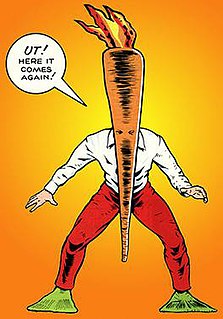
Flaming Carrot Comics was an American superhero comic book created by Bob Burden, featuring the absurd, surreal adventure of the title character.
A mind is the set of cognitive faculties that enables memory, consciousness, perception, thinking and judgement.
The Creator's Bill of Rights is a document drafted in November 1988 by a number of independent comic book artists, writers, and publishers, designed to protect their rights as creators and publishers and oppose exploitation by corporate work for hire practices and the power of distributors to dictate the means of distribution. Issues covered by the Bill included giving creators proper credit for their characters and stories, profit-sharing, distribution, fair contracts, licensing, and return of original artwork. The signing of the Bill spurred Cerebus creator and self-publisher Dave Sim and Teenage Mutant Ninja Turtles creators/self-publishers Kevin Eastman and Peter Laird to sell or continue selling collected volumes of their comics directly to readers via their periodic issues, rather than through direct market distributors selling the collections at comic book specialty shops. Comic book professionals that have commented on the Bill conclude that it had little or no impact on the comic book industry.

Journey: The Adventures of Wolverine MacAlistaire is an independent comic book created by William Messner-Loebs about Michigan frontier life in the 19th century. An ensemble piece, it tells the story of the Fort Miami settlement and the characters, both real and fictional, that occupy it. Among these is the title character, Joshua "Wolverine" MacAlistaire.

The Puma Blues was a comic book written by Stephen Murphy and drawn by Michael Zulli. It ran from June 1986 to early 1989, stretching over 23 regular issues and a single "half-issue" minicomic. In 2015 it was re-issued in a collected edition by Dover Comics & Graphic Novels with a new 40-page conclusion by Murphy and Zulli.

The Little Man: Short Strips 1980–1995 is a collection of short works by award-winning Canadian cartoonist Chester Brown, published by Drawn & Quarterly in 1998. It collects most of Brown's non-graphic novel short works up to that point, with the notable exception of his incomplete adaptations of the Gospels.

High Society is the second collected volume, and first volume-length story, of Canadian cartoonist Dave Sim's Cerebus comic book series. It focuses mainly on politics, including Cerebus' campaign for the office of Prime Minister, in the fictional city-state of Iest in Sim's world of Estarcion. It is generally considered the best book for beginning Cerebus readers to start with, and has been called "one of the finest storylines of the 1980s". The story was published in individual issues from May 1981 to May 1983 (#50), with the collection published in 1986.
Cerebus is the first collected volume of Canadian cartoonist Dave Sim's Cerebus comic book series. It is made up of the first 25 issues of Cerebus, plus, as of the 11th edition, some strips that ran in Comics Buyer's Guide featuring Silverspoon, a parody of the comic strip Prince Valiant.
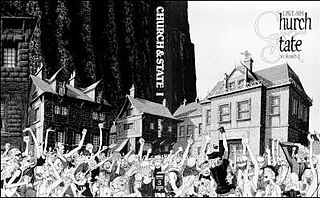
Church & State is the third novel in Canadian cartoonist Dave Sim's Cerebus comic book series. In it, Cerebus once again becomes Prime Minister, and eventually Pope. The story was published in individual issues from July 1983 to June 1988 (#111).

Jaka's Story is the fourth major storyline in Canadian cartoonist Dave Sim's Cerebus comics series.

Melmoth is the fifth novel in Canadian cartoonist Dave Sim's Cerebus comic book series. It follows Oscar in his last days leading up until his death, while Cerebus sits catatonic, clutching the doll of Jaka, the woman he loves but believes has been killed.
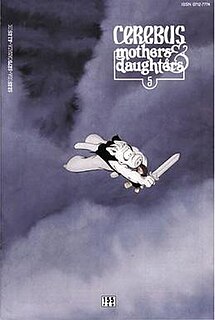
Mothers & Daughters: a novel is the sixth novel in Canadian cartoonist Dave Sim's Cerebus comic book series. Sim considers the novel to be the final portion of the main story. It collects Cerebus #151–200 in four volumes, the seventh through tenth volumes of the paperback "phone book" collections of the series, titled Flight, Women, Reads and Minds.

Guys is the seventh novel in Canadian cartoonist Dave Sim's Cerebus comic book series. It is made up of issues #201-219 of Cerebus and was collected as Guys in one volume in September 1997.
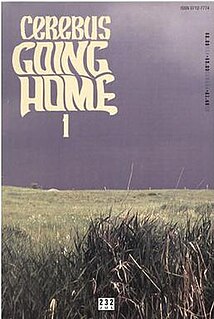
Going Home is the ninth novel in Canadian cartoonist Dave Sim's Cerebus comic book series. It is made up of issues #232–265 of Cerebus. It was collected as the 13th and 14th "phonebook" volumes, as Going Home and Form & Void.
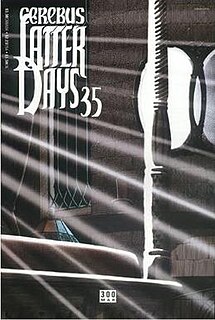
Latter Days is the tenth and final novel in Canadian cartoonist Dave Sim's Cerebus comic book series. It is made up of issues #266-300 of Cerebus. It was collected as the 15th and 16th "phonebook" volumes, as Latter Days and The Last Day.
Cerebus phonebooks are the paperback collections that Dave Sim has collected his comic book series Cerebus in since 1986. They have come to be known as "phonebooks" as their thickness and paper stock resemble that of phone books. The format had a large influence on alternative comics publishing and was key in the move from the periodical-centric publishing style that was once dominant.
















